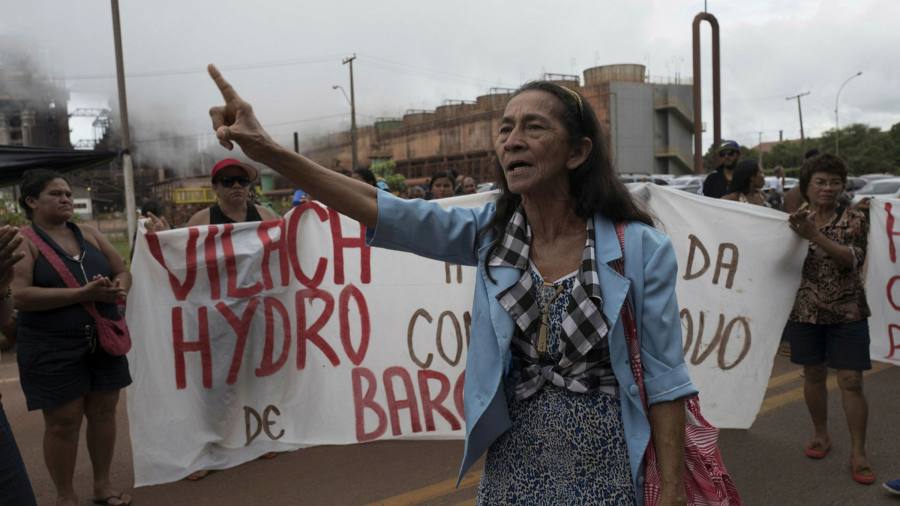[ad_1]
Internet blackouts in Myanmar, partly untreated rainwater from an aluminium plant flowing into a river in Brazil, suspect payments linked to a front company of the daughter of Uzbekistan’s former president and potential money laundering from Russia and Azerbaijan through the Baltics.
Nothing initially seems to connect these disparate events from around the world, but behind all of them stand Nordic companies. The Nordic countries themselves are seen globally as purer than driven snow, regularly featuring close to the top of anti-corruption rankings.
But various Nordic companies — from Telenor, Norsk Hydro and Telia to Danske Bank, Swedbank and Equinor — have become implicated in uncomfortable situations outside their home region in recent years. Each case is very different, but is there something common that underscores why Nordic companies keep on running into trouble abroad?
Anna Romberg, former head of the anti-corruption programme at Swedish telecoms operator Telia and co-founder of the Nordic Business Ethics Network, thinks there could be. She says much of it has to do with how Nordic countries have high levels of trust while many of the countries that the companies have difficulties in do not.
“Sometimes, Nordic people are called naive. I wouldn’t say that. But there’s a lack of understanding of how blessed we are. We have an independent, free press, strong trust. We don’t realise that context doesn’t exist when we go abroad. You can’t go into a highly corrupt country and just trust people blindly,†she said.
Telia’s own case ended with it paying almost $1bn to US and Dutch regulators in 2017 after admitting it had made $330m in corrupt payments to a front company linked to Gulnara Karimova, the socialite daughter of longtime former Uzbek president Islam Karimov. But Telia’s former chief executive and two other managers were acquitted by Swedish courts last month because Karimova was not in charge of telecoms policy in Uzbekistan, so the payments could not be classified as bribery.
But there are questions about state oversight. The Swedish state is, and was, Telia’s largest shareholder. Critics argue it appeared to do little to scrutinise Telia’s entry into central Asia. “Central Asia is high risk but I don’t think many questions were asked about how Telia was behaving,†said one banker.
In Norway, the recent difficulties facing aluminium producer Hydro and telecoms group Telenor are very different. Neither are accused of corruption, but both are in awkward positions and there are doubts again over political oversight, given the Norwegian state is the largest shareholder for both.
Aluminium producer Hydro is facing a court case in a Dutch court over claims that the “incorrect disposal of toxic waste†from operations in Brazil caused health problems, pollution and economic losses. The group disputes the claim, arguing that while it may have let rainwater flow into a local river in 2018 after a torrential storm without properly treating it in breach of local licences, there is no evidence that the level of heavy metals exceeded requirements for drinking water.
But Hydro does appear to have misread the situation in Brazil. An apology from the company’s chief executive for poor communication after the storm was interpreted locally more as an admission of liability, insiders say.
Telenor has faced scrutiny over its decision to build a mobile network in Myanmar since it entered the country in 2013, but the volume has increased since a military coup last month. The internet has been shut down multiple times in Myanmar in recent weeks. After Telenor initially publicised each shutdown order from the authorities as it was made, it has been banned from doing so since mid-February. “That is a big concern for us,†chief executive Sigve Brekke told the Financial Times last month.
Romberg says that while companies are on top of their financial risks, environmental, social and governance risks are often “outsourced†to media, active investors and social interest groups to uncover. Such was the case with the money-laundering allegations in the Baltics levelled against Danske and Swedbank, which were aired by local media with the help of whistleblowers.
Nordic companies need to understand and integrate ESG risks fully in their decision-making, Romberg says. Otherwise, more Nordic companies could suffer uncomfortable incidents abroad.
richard.milne@ft.com
[ad_2]
Source link





